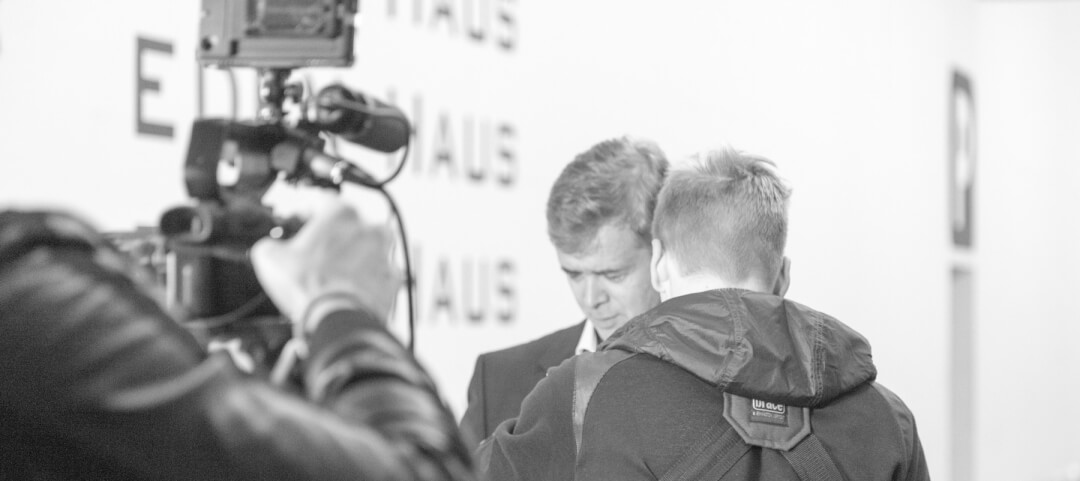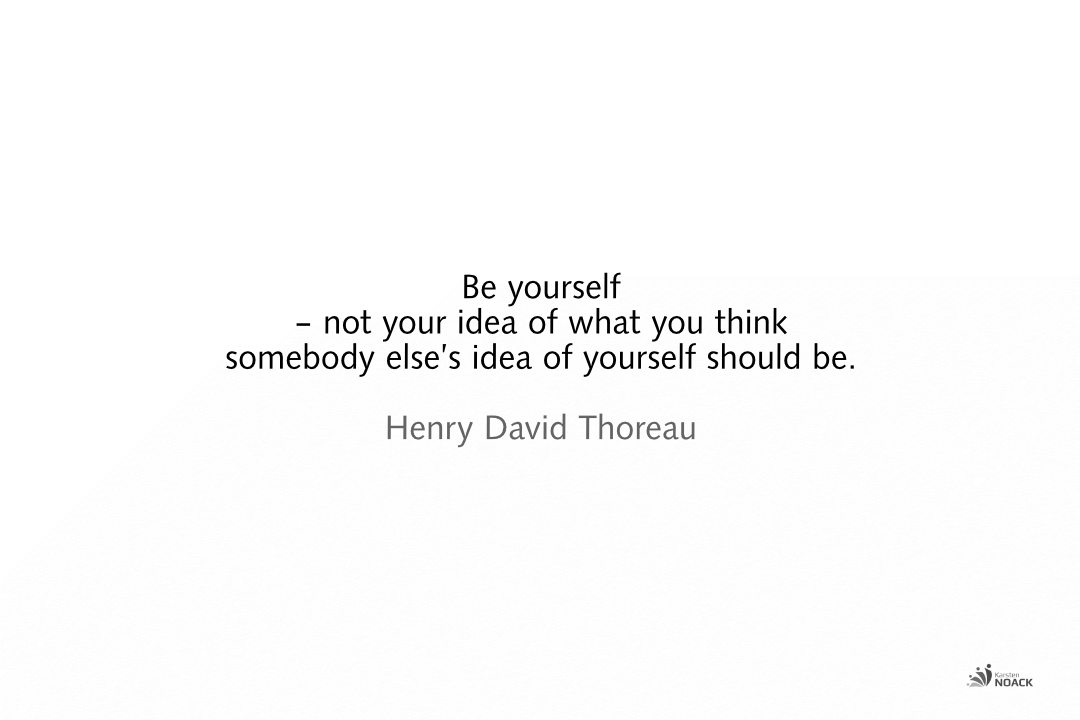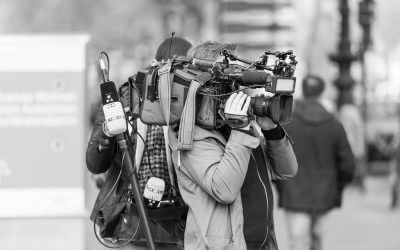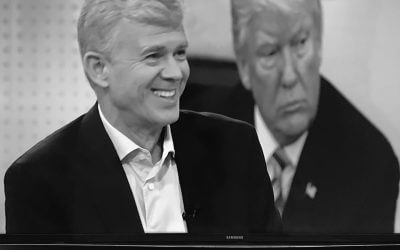26 tips for mastering television interviews
Tips and media training: How to prepare and master a tv interview
How to master television interviews
Most of the time it happens unexpectedly. That’s why you’ll find tips for preparing for and participating in television interviews here.
Overview
Television interviews
To appear in a television interview is an exceptional situation for most people. Even a speech in front of a few dozen listeners quickly increases the adrenaline rush for many people. The thought of explaining an even more complicated context to an audience of millions can cause fear. Some people just have to introduce themselves and it becomes a challenge.
26 tips for mastering television interviews
1. Do not panic
When a television team visits your premises, it usually takes nerves of steel. Cameras, lighting, microphones not only bring light into the rooms. Do you know a few breathing exercises? Very good! In general, everything will soon be fine again. And it usually looks worse than it does.
While countless cables are searching for sockets, use the time to prepare yourself. Having someone on-site to take care of everything else makes it easier for you to concentrate on your tasks.
Turn off your mobile phone to avoid being disturbed. Also, radiation can affect the recording.
A thorough look at the details will ensure that viewers are not distracted by open trousers, breakfast leftovers, or traces of lipstick later on.
Check your tie, shoelaces, zippers, buttons, protruding hair, and other accessories. A look in the mirror is less an expression of vanity than of professionalism.
2. Stay loose!
It is not helpful to think about what you want to say right before the start. This only makes you feel tense and makes you sound less spontaneous. Rigidly prepared answers only sound boring. It is better to prepare yourself at an early stage with appropriate support so that you can confidently accommodate your messages.
3. What is your message?
Which messages, more precisely core messages, do you want to convey?
During interview preparation, work out the core messages in simple, comprehensible sentences, preferably in short statements. Underpin these messages with good arguments. To reach the target group, you have to keep in mind the format and audience the journalist works for. This makes it easier to concentrate on the relevant aspects of the target groups.
4. Precaution is better than indulgence
The preparation also includes a risk assessment and, if necessary, the preparation of plans B, C, D, E and … If the initially friendly TV journalist turns into an investigative investigative investigative journalist whose questions without preparation would lead to outbursts of sweat, then it becomes clear that the effort was worth it.
Trust is good, preparation is better. Do not blindly rely on agreements, especially not on verbal promises. And even if you think you have an agreement. Hardly anything seems more alien to viewers than the hint that this question had not been discussed.
5. Television interviews are easier than radio interviews
Interviews are easier for television than for radio. The visual part allows you to look good, which usually means looking sympathetic and competent. Appearance, including body language, is an essential element of how you are perceived.
6. And where do I look?
To speak into this impersonal camera and talk with it as with a person, that does not please everyone immediately. Here, too, you can see how good the media training was.
Typically, someone next to the camera asks the questions, and you make eye contact there. The temptation to look even briefly into the camera is better not to succumb in such a case because it looks strange.
7. Dressed to …
The most important criterion in the choice of clothing: You feel comfortable in it, and it suits your role! However, there is a little more to consider here.
If the background is changed or faded in using the green screen in the studio, green clothing is a problem. The same is true for the blue screen, which is a bit less common. Either way, green or blue in clothing would lead to psychedelic effects, which are typically undesirable. Beware of the small-minded. This can cause a flickering picture. The viewers then consider the moiré effect to be a television defect.
What about white shirts? As good as it can look, white shirts make the face look gray because of the exposure.
It sounds worse than it is; there is still a choice of clothing. If necessary, it is worth asking the editorial staff for advice. I have had many unexpected experiences. For example, in my role as coach for Pro7. I had a protagonist who wore almost the same clothes as me in the last part. Since he also got the same haircut as me in the previous part at the hairdresser, he finally looked like a copy of me. Today, I can laugh about it more than at that time.
8. Lights! Camera! Action!
Camera set…. rolling … quiet please… and … ACTION! It needs silence in the studio and of course also when you are interviewed in your office. Make sure that you are not disturbed. The latter is often forgotten, and surprises are not always a source of joy for every participant.
9. Pay attention to the background
Check the environment and in particular your background. Pay close attention to what is directly behind your head. This will prevent you from having any amazing visual effects. Thanks to some office plants, some people on TV have looked like they have deer antlers or something alien growing out of your head.
10. Name and job title
Clarify in advance which job title will be displayed under your hopefully correctly spelled name. I was once involved in an experiment as a business coach and later a little surprised that I was announced by the moderator Ulrich Meyer as an experienced couple therapist. That was differently agreed upon. Today I have such details given to me in writing beforehand. Persnickety? Better be safe than sorry!
11. The overall impression counts
The television audience reacts very intensively to the appearance and the sound of the voice. If you don’t afford to make a big mistake, most viewers soon won’t remember what you said anyway. What remains is the overall impression you left behind. If you succeed in performing sympathetically and competently, you have already achieved a lot. Stay authentic and professional during the interview – it goes well together. Whatever you say, say it with authority.
12. Getting to the point
Knowledge alone is not enough, it must also be conveyed convincingly. Get to the point. Use short sentences to make your statement clear. The media will edit the answers to adapt them to the format. The press will focus on the statements their audience is interested in. News and entertaining stories have the greatest chance of being published.
If it’s not a live interview, the journalists, or those responsible for the post-editing, have control over how your contribution is used. If it does not fit into the concept, it may not be taken into consideration and the effort was wasted.
For the broadcasters, tight schedules and editorial deadlines are the norms. Make it easier for everyone involved and keep your answers appropriately short. Short answers have a better chance of being broadcast when recorded with editing. This will also increase your chances of being asked again in the future as a valued interview partner.
13. Renouncement of phrases
Your hint “As I just said…” is not only unnecessary, it makes video editing more difficult. The phrase makes it impossible to use the o-tone. Depending on the format, it is best to pick up the question with the answer, since the questions are often not sent by interviewers.
14. Pauses
In a recording, you speak in whole sentences, with small pauses in between. This also makes later editing easier.
15. Communication competence
Remember to pause when you have given your answer and when the interviewer signals that he wants to ask another question. Promote an atmosphere of conversation, show respect, and use your communication skills. In this way you come across authentically and credibly, convince of who you are and what you stand for.
16. Pay attention to comprehensibility
Anyone who wants to formulate too complex often stumbles incomprehensibly into the microphone. This is a mistake many beginners make. Because they want to appear particularly educated on television, they make long sentences with many insertions, use difficult foreign words or sophisticated formulations. In this way, they put themselves under pressure. The often bad breathing impairs the voice. In order not to lose the thread in eternally long sentences, the whole concentration of the speaker and the audience is needed. That’s exhausting! If the exaggerated choice of language is also misplaced by an annoying slip of the tongue, the audience laughs spontaneously. This makes the speaker even more nervous, the performance becomes embarrassing. Only a few people can master such situations in front of the camera. For example, with a sympathetic laugh about their flaws.
17. Do you want to be quoted afterward?
The probability that your answers will also be quoted in other places can be enhanced by the conciseness of your statements. Popular, but not without risk, are crisp sayings.
18. An interview is not the event of a sale!
The primary purpose of an interview is to entertain the audience. It’s wonderful if you profit from it. Otherwise, you wouldn’t do it anyway. The last thing the audience wants is your attempt to sell them something offensively. Who abuses the opportunity for the event of a sale commits such a deep breach of trust that it probably remains the last interview.
19. Practice makes perfect
Usually, interviews will improve with experience. Without competent feedback, however, some peculiarities can become apparent that should better be eliminated at an early stage. After the interview is before the next interview. So the interview better will be evaluated and improved afterward.
20. Shorter is better
It is also important to come to the point with the answers. The television team usually has enough other things to do. What may be a special moment for you is their everyday life, and some even have a private life. The sooner you reach a good result together, the better for all participants. If word gets around how pleasant and professional it is with you, this increases the probability of repetition.
21. Know the target group
Ask the journalist what the aim of the interview is and align your answers with it. The more precise your idea of the target group is, the easier it is to adapt your language. It is better to avoid jargon so that journalists don’t constantly ask about the meaning of your words.
Make it easier for journalists to understand why an aspect is so critical and why the target group should be interested in it. Do this in a simple, straightforward, and lively language. If you describe something, make sure that you experience it in front of your mind’s eye.
22. Listening
Unfortunately, uncertainty often leads to all attention being focused on preparing the next answer rather than listening well. Good interview partners are also good listeners.
23. Stay authentic
Present your personality authentically. Make your position clear and have your self-marketing strategy in mind. Behave professionally and remain yourself, even if the situation is initially not familiar to you. The better prepared you are for media appearances, the more naturally you will seize the opportunity and convince the audience.
24. Take care of yourself.
Some people are loose in front of the camera, while others are scared. Most people are not used to talking spontaneously in front of a camera. If you tense up, you probably tend to talk too fast, breathe too badly, your voice sounds tense and gets higher.
That appears less competent and sovereign. If you are alone in front of the camera, imagine a real person with whom you have a lively conversation. Flirt with the camera or whatever you would do with a real person. Then you will not talk monotonously. If you manage to perform naturally, you have the best chance of being asked again. Relaxed and authentic, you provide the easiest and most interesting answers.
25. After the interview is before the next interview
After the interview, thank you again for the opportunity. Declare your willingness to continue giving interviews on certain topics in the future. This increases the probability of being asked again. In general, every appearance in the media increases the likelihood of being asked again in the future. Get things rolling.
26. Seize the opportunity
Depending on expectations, i.e. opportunities and risks, the cost-benefit ratio can be estimated during preparation. Make the necessary decision carefully!
Train your media competence at an early stage and prepare concrete opportunities individually.
Support for your media presence
>You want to make the most of the opportunity. Do you want to face the questions and give convincing answers? Then I can help you prepare for your media appearance.
You decide on the extent of the support. My recommendation: Give yourself and your audience at least one rehearsal with professional feedback. Then you will know for yourself how you and your answers affect your target group, what you should and shouldn't do, where there is potential. Why wait until after you've performed to get such feedback? It's too late to correct. Then it is too late to correct. Cross-fire interviews in particular are very intense, and you only have the opportunity to look at the results afterward.
What does this professional support cost? The fees are listed here. You know best how much it will cost compared to the expected benefit. Take advantage of it. By the way, this can also be done with sessions via telephone or video support.
By the way, many people suffer from severe stage fright when they appear in the media and suffer through the performance. That's a shame, because with the right help, it's not necessary. Just in case ...
Just ask me personally
Please post any questions that may be of interest to other readers in the comments. Looking for professional help?
If you are interested in coaching, training or consulting, if you have organizational questions, or if you want to make an appointment, you can reach me best via this contact form (you can choose whether you want to enter your personal data) or via e-mail (mail@karstennoack.com). The privacy policy can be found here.
Transparency is important. That is why you will find answers to frequently asked questions already here, for example about me (profile), the services, the fees and getting to know me. If you like what you see, I look forward to working with you.
Remarks:
In the address bar of your browser, the URL should begin with "https://www.karstennoack.com/...". This indicates a secure connection (SSL). Whether you enter your real name is up to you.
Think twice before talking to the media
You get a call from a reporter who wants to interview you. Because you like the idea, you want to confirm it right away. Wait a minute!
Essential recommendations for media interviews
What you should keep in mind when being interviewed by the media. Here you will find 19 basic recommendations to help you and your message to be compelling in the media.
Body language expert explains Trump’s awkward day at the NATO Summit
It may be mere speculation that Donald Trump is compensating for something. Yes, certain behavior may give that impression. Let me analyze Donald Trump’s body language when he met Angela Merkel, Emmanuel Macron, Duško Marković and other leaders at the NATO-Summit in Brussels.

This article is a short excerpt from the more comprehensive course materials my clients receive in a group or individual training or coaching.
Published: January 2, 2009
Author: Karsten Noack
Revision: August 20th, 2023
Translation: ./.
German version: https://www.karstennoack.de/gespraeche-unterbrochen-werden-tipps-berlin/
K:
H:
T: RR
#452



0 Comments